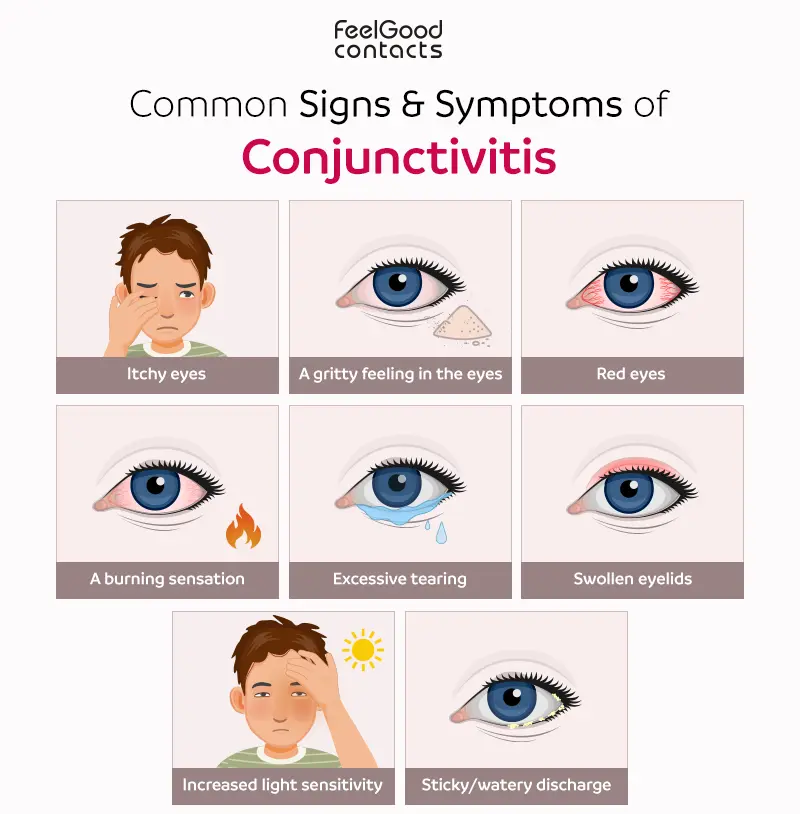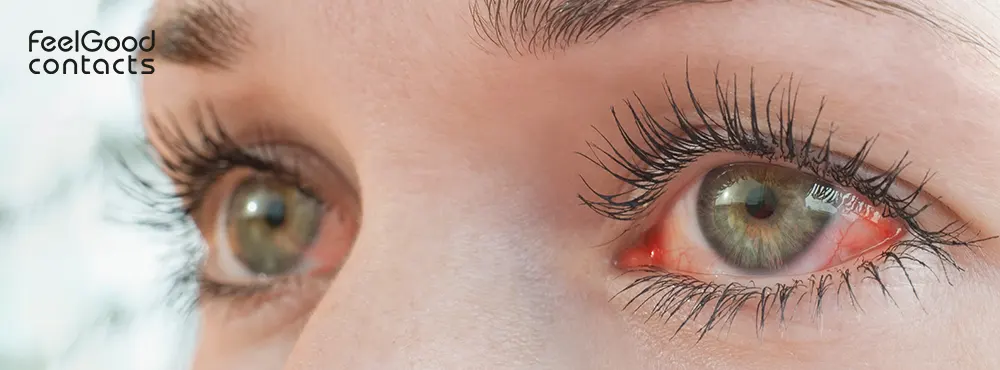Conjunctivitis is an eye condition that can be caused by bacteria, some allergens or a virus, like the common cold. Although it is not always painful, it can cause soreness and irritation in the eyes. Read this guide to learn about the different types, their symptoms and find effective treatments on how to get rid of conjunctivitis fast.
What is conjunctivitis?
Conjunctivitis or ‘pink eye’ is an inflammation of the conjunctiva. The conjunctiva is a thin transparent layer of tissue that covers the inner surface of the eyelids and the white part of the eyeball.
Types of conjunctivitis
There are three common types of conjunctivitis:
- Bacterial conjunctivitis is usually caused by bacteria and results in a sticky yellow or green discharge. It can spread easily, especially if you touch your eyes a lot.
- Viral conjunctivitis is a result of highly contagious viruses and often start in one eye and spread to the other. It is commonly associated with the common cold virus and results in a watery discharge.
- Allergic conjunctivitis is more common during allergy season or caused by dust, pollen or grass. It is more common in people with allergies.
What are the signs and symptoms of conjunctivitis?
It is important to recognise the signs and symptoms of conjunctivitis in the early stage to manage and treat this condition in time. Some of the common signs and symptoms include:

What causes conjunctivitis?
Inflammation of the conjunctiva can be caused by several different factors, depending on the type of conjunctivitis. This includes:
- Viruses like the common cold or flu.
- Bacteria such as Staphylococcus aureus or Streptococcus pneumoniae
- Allergens like pollen, dust mites or animal dander
- Irritants such as smoke, chlorine or other chemicals
Did you know that the most common type amongst adults is viral conjunctivitis? Children are generally more prone to bacterial conjunctivitis, especially in group settings like schools, where the bacteria can be passed on easily.
How to get rid of conjunctivitis fast
Firstly, it’s important not to wear your contact lenses if you think you have an eye infection of any type. Conjunctivitis can often clear up on its own in a week or two. However, the treatment depends on the type of conjunctivitis. The good news is that you can usually manage it at home most of the time. Here are a few tips to keep in mind to get rid of conjunctivitis fast:
For viral conjunctivitis:
- Use artificial preservative-free tears to soothe irritation.
- Apply cold compress and use lid wipes to keep the eyes clean.
- Wash your hands thoroughly and do not touch your eyes.
For allergic conjunctivitis:
The key is to remove the allergen causing the reaction.
- Seek advice from your GP or pharmacist. They may recommend some antihistamine eye drops.
- Use a cool compress to soothe your eyes.
- Keep your eyelids clean.
- Avoid rubbing your eyes as it will worsen the symptoms.
For bacterial conjunctivitis:
- Seek advice from your GP or pharmacist as they may recommend some antibiotic drops or ointment.
- Clean your eyes gently 2-3 times a day with lid care wipes.
- Avoid sharing towels and makeup as bacterial conjunctivitis is highly contagious.
Prevention tips for conjunctivitis
Pink eye can be contagious in some cases, so a little caution goes a long way:
- Always wash and dry your hands thoroughly before and after touching your eyes.
- Discard the contact lenses and lens case you used while you had conjunctivitis.
- Avoid rubbing or touching your eyes to reduce the risk of contamination.
- Wear sunglasses outdoors to protect your eyes from allergens.
- Don’t share towels, pillowcases, eye makeup and contact lenses
When to see a doctor?
Pink eye can often get better on its own within a week or so. If you’re not sure about it, don’t hesitate to ask for medical advice. Prompt treatment can prevent an infection from getting worse. You can speak to your GP, pharmacist or book an appointment with your optician. They will advise you on the most suitable treatment.
Disclaimer: The advice in this article is for informational purposes only and does not replace medical care or an in-person check-up. Please check with an eyecare professional before purchasing any products or remedies. For information on our article review process, please refer to our Editorial Policy.

 Offers
Offers Account
Account
 Favorite
Favorite
 Basket
Basket

 OFFERS
OFFERS

















